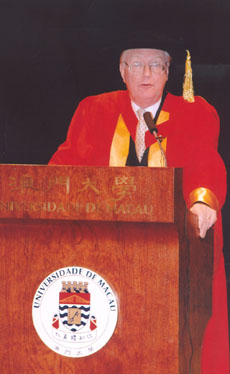Speech by Professor Sir James Mirrlees
 |
Chancellor, it is my pleasure to speak for all who are receiving degrees, and thank you for conferring a notable honour upon us. The conferment of degrees by a University such as the University of Macau, is a declaration that we are valued, and valued by those we respect. That is indeed a great thing, and we thank you for it.
We honorands have lived much of our lives in Universities, and, as we say in economics, that reveals a preference. The pursuit of knowledge proved so appealing that, once we had started, we could not give it up. Of course we have pursued knowledge in particular fields. In these days not even academics seek to know everything that is worth knowing, and to understand what anyone understands. But I must admit that these are tempting ambitions. Finding out more, about many topics, is one of the great pleasures in life.
The trouble is that so much has by now been discovered, or created, and so many interesting thoughts and arguments have been recorded, that it seems quite hopeless to know even a small fraction of what can be known. As a consequence, many of us have given priority to learning how to find things out, rather than just reading and remembering. In mathematics, we are interested, surely, in methods for solving problems, not simply in knowing the answers. The internet and search engines, the modern encyclopaedias, are typical: with these methods of discovery available, I suppose the need to memorize and remember has diminished.
Long ago, one of my friends, who like me had a rather poor memory, in the sense that we found memorizing hard, suggested that we were moderately good at mathematics because it provided a substitute for memory. Instead of remembering things, we could often work them out. As so often in life, a weakness generated a strength. The psychologist Adler pointed out how often people compensated for their weaknesses, like Beethoven composing despite his deafness. Another economist friend suggested that we ought to set an examination in which people were asked answer questions about facts they could not be expected to know, such as: what is the national income of Macau?, or how many people visit Britain in a year? By reasoning, on the basis of those things that are generally known, one should be able to provide decent estimates. We never tried it, but I do think it would encourage reasoning. It is more important to train and develop powers of reasoning than memory skills, and knowledge of facts. My experience as a teacher suggests it is harder.
We need people to be able to work out how to do and make things, and how to take rational decisions.
Yet the ambition of knowing a lot is not entirely hopeless. While the total of knowledge has expanded, something else has changed, which lets us know more. We can do things faster than people could in the past. We can travel much faster. It takes half a day to come from Europe to China, not the weeks that would be consumed by that journey in the past.
We have devices to speed up many of our activities, like cooking and cleaning. Not only that, but we actually have more time, because we are living longer. We can get to know many places, and meet people all over the world. Conversations do not require journeys any more, and enquiries for information can be fulfilled with great rapidity.
This greater pace of life helps, but not all that much. We do not read, or absorb knowledge, or write faster than our grandparents, or, I would guess, people two thousand years ago. Well, some authors do use modern technology to produce words at an amazing pace, but they produce books merely for passing the time. People should write less and talk less. In some spheres, supply does normally exceed demand.
I am reminded by today¡¦s occasion of one writer of the past who did the world proud, yet frequently bemoaned the poor use he thought he had made of his time. He was eventually rewarded in a way that suited and pleased him. Samuel Johnson, the great lexicographer, who created the first satisfactory dictionary of English had to leave the University of Oxford after one year: when his father died he could not afford to stay, but had to work to support the rest of the family. The eighteenth century was not a very distinguished period for that university, but Samuel Johnson regretted that his time there had been so short, and that he had no degree. Years later, Oxford made him an honorary doctor, and from that day to this, he has been known as Dr Johnson, a title he held in the highest esteem. There are a large number of words in English, and Dr Johnson not only wrote elegant definitions, but provided quotations as evidence of meaning. Imagine the time it must have taken. In his dictionary, where he allowed himself a few jokes, Dr Johnson defined a lexicographer as a ¡§harmless drudge¡¨. Yet he had plenty of time for the marvellous conversations Dr Boswell recorded. One wonders at the breadth and depth of his interests and knowledge, revealed in that biography. Not really, or not entirely, a ¡§harmless drudge¡¨, then. Though drudgery and not doing harm may earn us doctorates, we can hope there was more to it than that.
Thank you, then, Chancellor, and thank you to this University for being here, and for honouring us today.